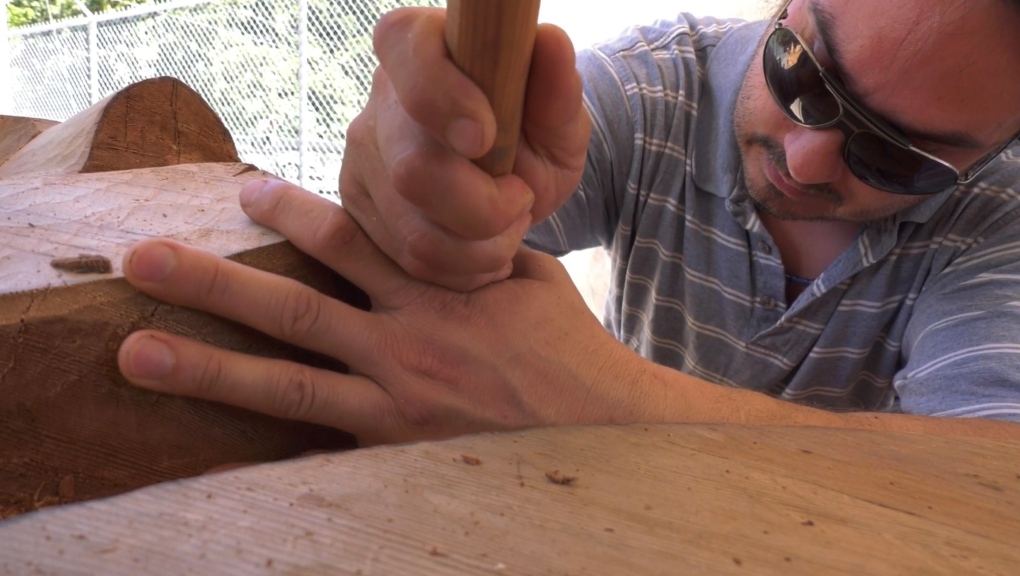Malahat Nation and supporters march for residential school survivors, victims
With the discovery of 1,000 unmarked graves in total at two residential school sites in Canada, the country is in mourning. That has prompted a First Nation artist and organizers from two different Vancouver Island Nations to try to bring communities together while acknowledging Canada’s dark past.
“I’m honoured for all the supporters we have, this is medicine for us,” said Paul Harry, who is an Indian Day School survivor.
Paul and his brother, Francis Harry, of the Malahat Nation are bringing their and the surrounding community together.
“You see a lot of non-natives here and we see a lot of band members here. Different band members from Musqueam, West Saanich, Vancouver,” said Francis, also an Indian Day School Survivor.
The two organized a community march to begin at the Malahat First Nation longhouse and continue along the Trans Canada Highway on Friday. It was intended to draw attention to the unmarked graves found on two residential school sites in Kamloops and now Saskatchewan. They are also demanding an apology.
“We want our voices to be heard by the government, from the Catholics, and the RCMP for the kidnapping – and helping the Catholics take the children away,” said Francis.
Well over 100 people of all different ages and backgrounds walked in solidarity with the nation on Friday, something that the Malahat council is encouraged to see.
“Well I hope that we all move forward together,” said Gordon Harry, Malahat councillor. “In the march it’s not only just Indigenous people, so it looks like everyone is gathering together as one.”
In Port Alberni, acknowledging Canada’s dark past comes through ancient Indigenous carvings.
“It represents the culture, the language, history,” said Joshua Shaw, one of the carvers.
 Indigenous carver Joshua Shaw is seen working on a totem pole that will be put up in Port Alberni in recognition of residential school survivors and victims: June 25, 2021 (CTV News)
Indigenous carver Joshua Shaw is seen working on a totem pole that will be put up in Port Alberni in recognition of residential school survivors and victims: June 25, 2021 (CTV News)
Shaw is working on a totem pole, which is expected to be completed by the end of the summer. It will reflect Indigenous languages, and will acknowledge healing from residential schools.
“Justice needs to be done,” said Shaw. “Now the rest of Canada has evidence that we already knew, and it’s just sad that it has taken so long for this to come out.”
Once completed, the pole will be located along the water on Rogers Street in Port Alberni.
Like the march, it is just one of many different ways Indigenous people in Canada are trying to move forward, in the wake of such horrifying discoveries from our past.
CTVNews.ca Top Stories

Teenage phenom Gavin McKenna scores, Canada tops Finland 4-0 in world junior opener
Teenage sensation Gavin McKenna scored late in the first period and Carter George made 31 saves for the shutout as Canada picked up a 4-0 victory over Finland in the host country's opener at the world junior hockey championship Thursday.
Ministers Joly, LeBlanc travel to Florida to meet with Trump's team
Two members of Prime Minister Justin Trudeau's cabinet will be in Palm Beach, Fla., Friday to meet with members of Donald Trump's team.
Hwy. 401 off-ramp shut down due to Boxing Day deal-hunters now reopen
A Highway 401 off-ramp west of Toronto that became so clogged up with Boxing Day deal-hunters Thursday that police had to shut it down out of safety concerns has re-opened.
India alleges widespread trafficking of international students through Canada to U.S.
Indian law enforcement agencies say they are investigating alleged links between dozens of colleges in Canada and two 'entities' in Mumbai accused of illegally ferrying students across the Canada-United States border.
Teen actor Hudson Meek, who appeared in 'Baby Driver,' dies after falling from moving vehicle
Hudson Meek, the 16-year-old actor who appeared in 'Baby Driver,' died last week after falling from a moving vehicle in Vestavia Hills, Alabama, according to CNN affiliate WVTM.
B.C woman awarded nearly $750K in court case against contractor
A B.C. woman has been awarded nearly $750,000 in damages in a dispute with a contractor who strung her along for a year and a half and failed to complete a renovation, according to a recent court decision.
Florida pizza deliverer charged with stabbing pregnant woman after tip dispute
A pizza deliverer in central Florida has been charged with pushing her way into a motel room with an accomplice and stabbing a pregnant woman after a dispute over a tip, authorities said.
2 minors, 2 adults critically injured in south Calgary crash; incident was preceded by a robbery
Multiple people were rushed to hospital, including two minors, in the aftermath of a serious vehicle collision on Thursday morning.
Christmas Eve stowaway caught on Delta airplane at Seattle airport
A stowaway was caught trying to nab a ride on a Delta Air Lines plane at Seattle-Tacoma International Airport on Christmas Eve.
































